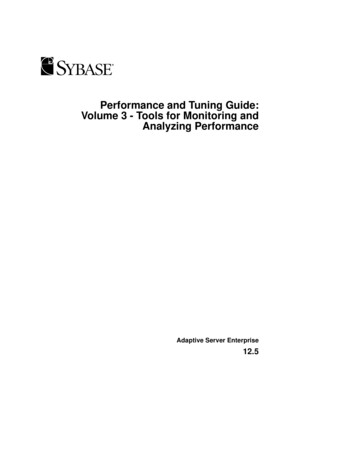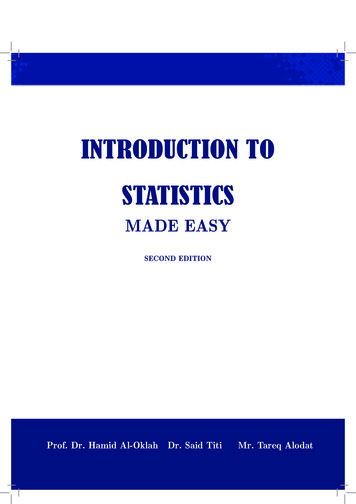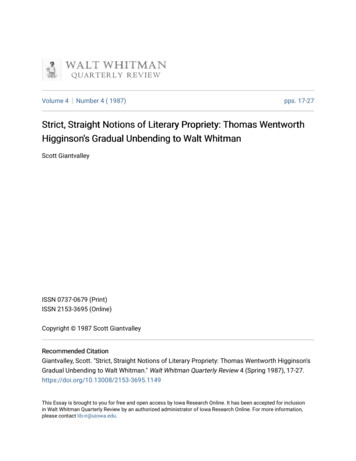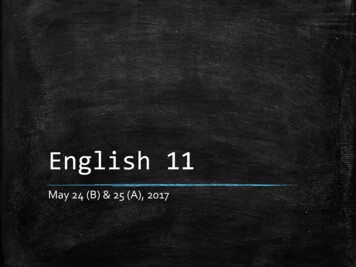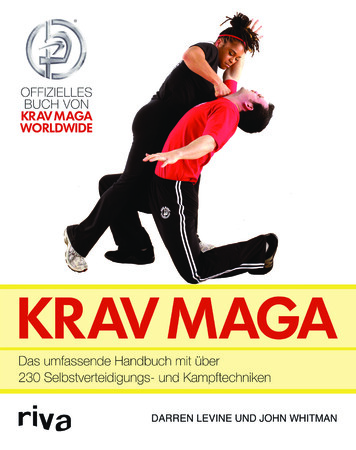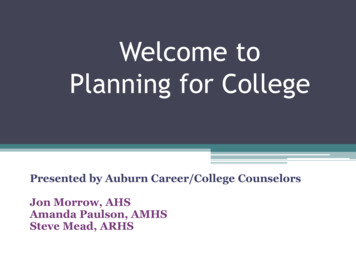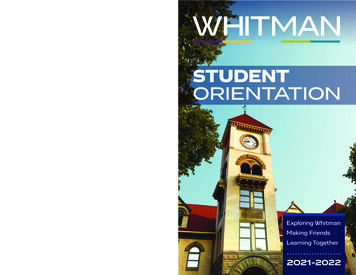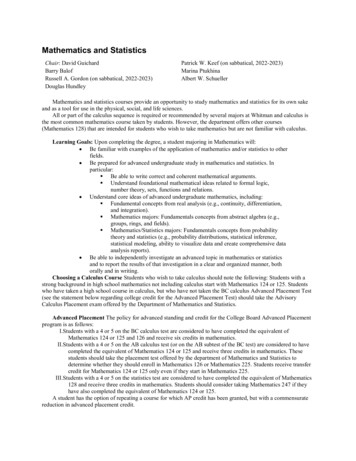
Transcription
Mathematics and StatisticsChair: David GuichardBarry BalofRussell A. Gordon (on sabbatical, 2022-2023)Douglas HundleyPatrick W. Keef (on sabbatical, 2022-2023)Marina PtukhinaAlbert W. SchuellerMathematics and statistics courses provide an opportunity to study mathematics and statistics for its own sakeand as a tool for use in the physical, social, and life sciences.All or part of the calculus sequence is required or recommended by several majors at Whitman and calculus isthe most common mathematics course taken by students. However, the department offers other courses(Mathematics 128) that are intended for students who wish to take mathematics but are not familiar with calculus.Learning Goals: Upon completing the degree, a student majoring in Mathematics will: Be familiar with examples of the application of mathematics and/or statistics to otherfields. Be prepared for advanced undergraduate study in mathematics and statistics. Inparticular: Be able to write correct and coherent mathematical arguments. Understand foundational mathematical ideas related to formal logic,number theory, sets, functions and relations. Understand core ideas of advanced undergraduate mathematics, including: Fundamental concepts from real analysis (e.g., continuity, differentiation,and integration). Mathematics majors: Fundamentals concepts from abstract algebra (e.g.,groups, rings, and fields). Mathematics/Statistics majors: Fundamentals concepts from probabilitytheory and statistics (e.g., probability distributions, statistical inference,statistical modeling, ability to visualize data and create comprehensive dataanalysis reports). Be able to independently investigate an advanced topic in mathematics or statisticsand to report the results of that investigation in a clear and organized manner, bothorally and in writing.Choosing a Calculus Course Students who wish to take calculus should note the following: Students with astrong background in high school mathematics not including calculus start with Mathematics 124 or 125. Studentswho have taken a high school course in calculus, but who have not taken the BC calculus Advanced Placement Test(see the statement below regarding college credit for the Advanced Placement Test) should take the AdvisoryCalculus Placement exam offered by the Department of Mathematics and Statistics.Advanced Placement The policy for advanced standing and credit for the College Board Advanced Placementprogram is as follows:I.Students with a 4 or 5 on the BC calculus test are considered to have completed the equivalent ofMathematics 124 or 125 and 126 and receive six credits in mathematics.II.Students with a 4 or 5 on the AB calculus test (or on the AB subtest of the BC test) are considered to havecompleted the equivalent of Mathematics 124 or 125 and receive three credits in mathematics. Thesestudents should take the placement test offered by the department of Mathematics and Statistics todetermine whether they should enroll in Mathematics 126 or Mathematics 225. Students receive transfercredit for Mathematics 124 or 125 only even if they start in Mathematics 225.III.Students with a 4 or 5 on the statistics test are considered to have completed the equivalent of Mathematics128 and receive three credits in mathematics. Students should consider taking Mathematics 247 if theyhave also completed the equivalent of Mathematics 124 or 125.A student has the option of repeating a course for which AP credit has been granted, but with a commensuratereduction in advanced placement credit.
GCE (Cambridge International) A-Level Exam students with an A*, A or B on the A-Level Mathematics Examare considered to have completed the equivalent of Mathematics 124 or 125 and receive 3 credits in Mathematics.P-D-F policy: The department places no restrictions on the use of the P-D-F option for mathematics courses formajors or non-majors, except that students choosing the Mathematics major must take Mathematics 225, 240, and260 for grades. The department strongly recommends that students majoring in Mathematics or completing a jointmajor with Mathematics not use the P-D-F option in mathematics and statistics courses.Distribution: Mathematics 124, 125, 126, 128, 225, and 247 apply to the quantitative analysis distribution area.Total credit requirements for a Mathematics major: A student who enters Whitman College without a goodworking knowledge of the material in Mathematics 125 and 126 will have to complete 41 mathematics credits tofulfill the requirements for the Mathematics major (including six credits for Mathematics 124 or 125, 126).The Mathematics major: 35 Credits (41 credits if starting with Mathematics 124 or 125) Required Courseso Mathematics 225, 240, 260, 455, 475; 497 or 498 12 additional credits numbered above 200 (excluding 220) Other noteso An average of the grades received in Mathematics 225, 240, and 260 of 2.5 or better is required All three courses ought to be completed by the end of the sophomore year Grades of B (3.0) or better are strongly recommended if considering Mathematics as amajor For students with transfer credit in one or more of these courses, the grade earned at theinstitution shall be usedo Students planning graduate study should complete Mathematics 456 and 476 Acquire a reading knowledge of either French, German, or Russian Senior Requirementso Mathematics 497 or 498o Written exam in September and oral exam in Januaryo Senior assessment consists of the written exam in mathematics and an oral exam over general andadvanced topics. Honorso Students do not apply for admission to candidacy for honorso Accumulated at least 87 creditso Completed two semesters of residency at Whitman.o Cumulative GPA of at least 3.300 on all credits earned at Whitman Collegeo Major GPA of at least 3.500o Complete a written thesis or research project prepared exclusively for the satisfaction of thisprogramo Earn a grade of at least A- on the honors thesis or project and the honors thesis courseo Pass the senior assessment with distinctiono Chair of the department will notify the Registrar of students attaining Honors no later than thebeginning of week 12 of the semester.o An acceptable digital copy of the Honors Thesis must be submitted to Penrose Library no laterthan Reading DayThe Mathematics minor: 15 Creditso Courses numbered 200 or aboveo At least three credits must be from a course numbered 300 or aboveThe Data Science minor: 19 Credits
Required Courseso Computer Science 167o Mathematics/Computer Science 215o Mathematics 240 and 247Other minor requirementso Two other courses from the following Mathematics 248, 339, 347, 349, 350; Geology 418Other noteso If also a Mathematics major, Mathematics 240 will satisfy both the Mathematics major andData Science minor requirements.The Mathematics-Statistics combined major: 34-36 credits plus 19-24 credits outside of the dept (from the minor requirement and Computer Sciencecourse)Required Mathematics courses: Mathematics 225, 240, 260, 350, 455Required Statistics courses: Mathematics 247, 248, 347, 349, 438Required Computer Science courses: Computer Science 167 A minor in any one of the following departments: Astronomy, Biology, Chemistry, Geology, Physics,Economics, Sociology, Psychology Notes: Students may satisfy the minor requirement by completing a second major in one of the listeddepartments in the minor requirement section Students may not double major this degree with any of the following second majors:Mathematics, Economics-Mathematics, or Mathematics-Physics Honors: Students do not apply for admission to candidacy for honors Accumulated at least 87 credits Completed two semesters of residency at Whitman. Cumulative GPA of at least 3.300 on all credits earned at Whitman College Major GPA of at least 3.500 Complete a written thesis or research project prepared exclusively for the satisfaction of thisprogram Earn a grade of at least A- on the honors thesis or project and the honors thesis course Pass the senior assessment with distinction Chair of the department will notify the Registrar of students attaining Honors no later than thebeginning of week 12 of the semester. An acceptable digital copy of the Honors Thesis must be submitted to Penrose Library nolater than Reading DayThe Economics-Mathematics major: 49 (27 credits in Economics and 22 credits in Mathematics) Required Courseso Economics 100 or 101, 102, 307, 308, 327, 428o One additional course in Economics (letter graded)o Mathematics 225, 240, 244, 247, 248, 349o 3 credits 200 level and above in mathematics Other notes
For Economics 327, Economics 227 or Mathematics 128 or 247 are a prerequisite Economics 227 and Mathematics 128 do not count toward major requirementso Students with a score of 5 on the Principles of Microeconomics AP test will receive fourcredits for Economics 101o Students with a score of 5 on the Principles of Macroeconomics AP test will receive fourcredits for Economics 102.o Students with a score of 6 or higher on the higher level IB Economics test will receive a totalof eight credits for Economics 101 and 102.o Courses taken PDF (including Economics 493 and 494) and Economics 498 may not be usedto meet the credit requirementSenior Requirementso Senior assessment Written exam in mathematics Major Field Test (MFT; only offered in the spring) in economics Combined oral exam Scheduled by the Economics Departmento Honorso Students submit an Honors in Major Study Application to their departmento Students must submit a proposal for their thesis or project Must be submitted within the first six weeks of the two-semester period in whichstudent is eligibleo Accumulated at least 87 creditso Completed two semesters of residency at Whitman.o Cumulative GPA of at least 3.300 on all credits earned at Whitman Collegeo Major GPA of at least 3.500o Complete a written thesis or research project prepared exclusively for the satisfaction of thisprogramo Earn a grade of at least A- on the honors thesis or project and the honors thesis course.o Pass the senior assessment with distinctiono The department will submit the Honors applications to the Registrar’s Office of studentspursuing Honors by the specified deadlineo The department submit “Senior Assessment/Major Study Certificate” to the Registrar’s Officeno later the Reading Dayo An acceptable digital copy of the Honors Thesis must be submitted to Penrose Library nolater than Reading Dayo For more details ent-honorsThe Mathematics-Physics combined major: 49 credits (24 credits in Physics and 25 credits in Mathematics, if starting with Physics 155 andMathematics 124 or 125)Required Mathematics courseso Mathematics 225, 240, 244; and either 367 or 368o 6 additional credits in Mathematic courses numbered above 200Required Physics courseso Physics 145 or 155 or 347o Physics 156, 245, 255, and 267o Three additional courses from among 300 to 480 level physics offerings and the course/labcombination of BBMB 324/334. This category’s course selection must include at least two of thefollowing: Physics 325, 339, 347, 357, or 385 Physics 347 may not be used to satisfy multiple requirements
Other noteso If students place out of Physics 155 they must take 347Senior Requirementso Senior assessment Written exam in mathematics Written exam in physics Combined oral exam Scheduled by the physics departmentHonorso Students submit an Honors in Major Study Application to their departmento Students must submit a proposal for their thesis or project Must be submitted within the first six weeks of the two-semester period in which studentis eligibleo Accumulated at least 87 creditso Completed two semesters of residency at Whitman.o Cumulative GPA of at least 3.300 on all credits earned at Whitman Collegeo Major GPA of at least 3.500o Complete a written thesis or research project prepared exclusively for the satisfaction of thisprogramo Earn a grade of at least A- on the honors thesis or project and the honors thesis course.o Pass the senior assessment with distinctiono The department will submit the Honors applications to the Registrar’s Office of students pursuingHonors by the specified deadlineo The department submit “Senior Assessment/Major Study Certificate” to the Registrar’s Office nolater the Reading Dayo An acceptable digital copy of the Honors Thesis must be submitted to Penrose Library no laterthan Reading Day124 Introduction to CalculusFallBalof4 creditsTopics include limits and continuity. Definition, computation and applications of the derivative. An introduction tointegration, including the fundamental theorem of calculus. Of the 4 credits, approximately 1 credit will becommitted to a parallel track of instruction that introduces and/or reviews topics in algebra, trigonometry,exponential and log functions and graphing as they are being encountered in the calculus curriculum. Prerequisites:two years of high school algebra; one year of plane geometry125 Calculus IFall, SpringFall: Staff; Spring: Staff3 creditsTopics include limits and continuity. Definition, computation and applications of the derivative. An introduction tointegration, including the fundamental theorem of calculus. Prerequisites: two years of high school algebra; oneyear of plane geometry; and knowledge of trigonometry and exponential/logarithmic functions or consent ofinstructor.126 Calculus IIFall, SpringFall: Guichard; Spring: Staff3 creditsA continuation of Mathematics 125, covering techniques for computing indefinite integrals, applications of thedefinite integral, infinite sequences and series, Taylor polynomials and power series. Prerequisite: Mathematics 124or 125 or equivalent.128 Introduction to StatisticsFall, SpringPetersen3 creditsThis course introduces students to basic tools for describing and summarizing data as well as methods of statisticalinference such as confidence intervals and hypothesis tests. The randomization approach used in the course allowsstudents to develop a deeper understanding of the fundamental idea of statistical inference. A web-based statistical
applet is used throughout the course. This course does not count toward the Mathematics major or Data Scienceminor. Students considering these should enroll in Mathematics 247 instead. Prerequisite: two years of high schoolmathematics.203, 204 Special Topics in Introductory Level Mathematics1-3 creditsOn occasion, the mathematics and statistics department will offer courses on introductory topics in mathematics andstatistics that are not generally covered in other introductory courses. Possible topics include Introduction to NumberTheory, Chaos and Applied Discrete Probability. Any current offerings follow.203 ST: History of MathematicsSpringBalof3 creditsThe course will explore the cross-cultural roots of mathematical ideas and topics through examination ofprimary and secondary sources. The main emphasis will be on problem solving using the tools and ideasavailable to mathematicians of a given time period. Prerequisite: Mathematics 126 or equivalent.Distribution area: none.215 Introduction to Data ScienceFallPtukhina4 creditsAn introduction to the approaches and tools of exploratory data analysis and visualization. Through a series ofprojects, we explore large data sets through methods like cleaning, filtering, sorting, boolean selections and merging.As large amounts of data typically are stored in lists, we use algorithmic thinking to transform raw data into usableform. We develop hypotheses and supporting visualizations to tell the story of the data. We learn and practicetechnical communication in both oral and written form. Through a series of readings and discussions, we learn bestpractices for the ethical use of data and how to identify problematic uses of data in society. May be elected asComputer Science 215. Prerequisites: Mathematics 124 or 125, and Computer Science 167 or 270.220 Discrete Mathematics & Functional ProgrammingFallJ. Davis3 creditsStudents will practice formal reasoning over discrete structures through two parallel modes: mathematical proofsand computer programs. We will introduce sets and lists, Boolean logic, and proof techniques. We will explorerecursive algorithms and data types alongside mathematical and structural induction. We consider relations andfunctions as mathematical objects built on set theory and develop idioms of higher-order programming. May beelected as Computer Science 220. Prerequisites: Computer Science 167 or Computer Science 270, and Mathematics124 or 125.225 Calculus IIIFall, SpringStaff4 creditsTopics include three dimensional geometry, partial derivatives, gradients, extreme value theory for functions ofmore than one variable, multiple integration, line integrals, and various topics in vector analysis. Prerequisite:Mathematic 126.240 Linear AlgebraFall, SpringFall: Hundley; Spring: Staff3 creditsThis course first considers the solution set of a system of linear equations. The ideas generated from systems ofequations are then generalized and studied in a more abstract setting, which considers topics such as matrices,determinants, vector spaces, inner products, linear transformations, and eigenvalues. Prerequisite: Mathematics126; Mathematics 225 is highly recommended.
244 Differential EquationsFall, SpringHundley3 creditsThis course includes first and second order linear differential equations and applications. Other topics may includesystems of differential equations and series solutions of differential equations. Prerequisite: Mathematics 225.247 Statistics with ApplicationsFall, SpringFall: Petersen; Spring: Ptukhina3 creditsAn introduction to statistics for students who have taken at least one course in calculus. This course focuses onintroducing statistical concepts and inference through active learning assignments. Students learn about the processof statistical investigations. This includes data collection and exploration, methods of statistical inference, and theability to draw appropriate conclusions. The widely-used statistical software R will be used in addition to webbased applets. Prerequisite: Mathematics 124 or 125 or equivalent.248 Statistical ModelingFallPtukhina3 creditsThis course follows introductory statistics by investigating more complex statistical models and their application toreal data. The topics may include simple linear regression, multiple regression, non-parametric methods, and logisticregression. A statistical software package will be used. Prerequisite: Mathematics 128, Mathematics 247,Economics 227, or Environmental Studies 207.260 An Introduction to Higher MathematicsFall, SpringFall: Balof; Spring: Guichard4 creditsAn introduction to some of the concepts and methodology of advanced mathematics, including a brief introductionto number theory. Emphasis is on the notions of rigor and proof. This course is intended for students interested inmajoring in mathematics and statistics; students should plan to complete it no later than the spring semester of thesophomore year. Prerequisite: Mathematics 225.281, 282 Independent StudyFall, SpringStaff1-3 creditsA reading project in an area of mathematics and statistics not covered in regular courses or that is a proper subset ofan existing course. The topic, selected by the student in consultation with the staff, is deemed to be introductory innature with a level of difficulty comparable to other mathematics and statistics courses at the 200-level. May berepeated for a maximum of six credits. Prerequisite: consent of supervising instructor.287 Independent Study in GeometryNot offered 2022-233 creditsThis independent study in geometry will include a review of high school geometry, a few topics in advancedEuclidean geometry, a reading of Books I and II of Euclid's Elements, and an introduction to hyperbolic geometry.The grading for the course will be based on a journal (40%), a two-hour written midterm exam (30%), and a onehour oral final exam (30%). Since the student will be working independently on the material, a disciplined workethic is required. Prerequisite: Mathematics 225 and consent of instructor.299 Problem-Solving in MathematicsFallBalof1 creditStudents will meet weekly to discuss problem-solving techniques. Each week a different type of problem will bediscussed. Topics covered will include polynomials, combinatorics, geometry, probability, proofs involvinginduction, parity arguments, and divisibility arguments. The main focus of the course will be to prepare students forthe William Lowell Putnam Mathematics Competition, a national examination held the first Saturday in December.Students who place in the top 500 on this exam nationwide have their names listed for consideration to mathematicsgraduate programs. Graded credit/no credit. May be repeated for a maximum of four credits. Prerequisite:Mathematics 260 or consent of instructor.
320 Theory of ComputationFallStratton3 creditsWhich problems can be solved computationally? Which cannot? Why? We can prove that computers can performcertain computations and not others. This course will investigate which ones, and why. Topics will include formalmodels of computation such as finite state automata, push-down automata, and Turing machines, as well as formallanguages such as context-free grammars and regular expressions. May be elected as Computer Science 320.Prerequisite: Computer Science/Mathematics 220 or Mathematics 260.327 Algorithm Design & AnalysisSpringStratton3 creditsHow can we be confident that an algorithm is correct before we implement it? How can we compare the efficiencyof different algorithms? We present rigorous techniques for design and analysis of efficient algorithms. We considerproblems such as sorting, searching, graph algorithms, and string processing. Students will learn design techniquessuch as linear programming, dynamic programming, and the greedy method, as well as asymptotic, worst-case,average-case and amortized runtime analyses. Data structures will be further developed and analyzed. We considerthe limits of what can be efficiently computed. May be elected as Computer Science 327. Prerequisites: ComputerScience 270; Computer Science/Mathematics 220 or Mathematics 260.337 GeometryNot offered 2022-233 creditsEssential for prospective high school mathematics teachers, this course includes a study of Euclidean geometry, adiscussion of the flaws in Euclidean geometry as seen from the point of view of modern axiomatics, a considerationof the parallel postulate and attempts to prove it, and a discussion of the discovery of non-Euclidean geometry andits philosophical implications. Prerequisite: Mathematics 126.339 Operations ResearchNot offered 2022-233 creditsOperations research is a scientific approach to determining how best to operate a system, usually under conditionsrequiring the allocation of scarce resources. This course will consider deterministic models, including those in linearprogramming (optimization) and related subfields of operations research. May be elected as Computer Science 339.Prerequisites: Mathematics 240 and Computer Science 167 or 270.347 Design and Analysis of Research StudiesSpringPtukhina4 creditsStatistical concepts and statistical methodology useful in descriptive, experimental, and analytical study ofbiological and other natural phenomena. Course covers major design structures, including blocking, nesting andrepeated measures (longitudinal data), and statistical analysis associated with these structures. Prerequisite:Mathematics 247 or Economics 227.349 Probability TheorySpringPetersen3 creditsA formal introduction to probability and randomness. The topics of the course include but are not limited toconditional probability, Bayes’ Theorem, random variables, the Central Limit Theorem, expectation and variance.Both discrete and continuous probability distribution functions and cumulative distribution functions are studied.Prerequisite: Mathematics 225.350 Mathematical Modeling and Numerical MethodsSpringHundley3 creditsThis course explores the process of building, analyzing and interpreting mathematical descriptions of physicalprocesses. This may include theoretical models using statistics and differential equations, simulation modeling, andempirical modeling (meaning model building from data). The course will involve some computer programming, so
previous programming experience is helpful. May be elected as Computer Science 350. Prerequisites: Mathematics240 and 244.358 Combinatorics and Graph TheoryNot offered 2022-233 creditsTopics in elementary combinatorics, including: permutations, combinations, generating functions, the inclusionexclusion principle, and other counting techniques; graph theory; and recurrence relations. Prerequisite:Mathematics 260 or consent of instructor.367 Engineering MathematicsSpringHundley3 creditsAn introduction to mathematics commonly used in engineering and physics applications. Topics may include: vectoranalysis and applications; matrices, eigenvalues, and eigenfunctions; boundary value problems and spectralrepresentations; Fourier series and Fourier integrals; solution of partial differential equations of mathematicalphysics; differentiation and integration of complex functions, residue calculus, conformal mapping. Prerequisite:Mathematics 244.368 Complex VariablesNot offered 2022-233 creditsComplex analysis is the study of functions defined on the set of complex numbers. This introductory course coverslimits and continuity, analytic functions, the Cauchy-Riemann equations, Taylor and Laurent series, contourintegration and integration theorems, and residue theory. Prerequisite: Mathematics 225.371- 373 Special Topics1-3 creditsAny current offerings follow.438 Statistical TheoryNot offered 2022-234 creditsThis course studies the mathematical theory of statistics with a focus on the theory of estimation and hypothesistests. Topics may include properties of estimators, maximum likelihood estimation, convergence in probability, thecentral limit theorem, order statistics, moment generating functions, and likelihood ratio tests. A statistical softwarepackage will be used. Prerequisites: Mathematics 349 and one of the following: Mathematics 128, Mathematics247, Economics 227, or Environmental Studies 207.455 Real Analysis IFallSchueller4 creditsProvides a rigorous study of the basic concepts of real analysis, with emphasis on real-valued functions defined onintervals of real numbers. Topics include sequences, continuity, differentiation, integration, and infiniteseries. Prerequisite: Mathematics 260.456 Real Analysis IINot offered 2022-234 creditsThe content varies from instructor to instructor with typical topics chosen from series of functions, topology of thereal line, basic concepts of metric spaces, the calculus of vector-valued functions, and more advanced integrationtheory. Prerequisite: Mathematics 455.467 Numerical AnalysisNot offered 2022-233 creditsAn introduction to numerical approximation of algebraic and analytic processes. Topics include numerical methodsof solution of equations, systems of equations and differential equations, and error analysis of approximations. Maybe elected as Computer Science 467. Prerequisite: Computer Science 167 or Computer Science 270. Pre- orcorequisite: Mathematics 240.
471- 473 Special Topics1-3 creditsOn occasion, the mathematics and statistics department will offer courses on advanced topics in mathematics andstatistics that are not found in other course offerings. Possible topics include topology, number theory, and problemsolving. Any current offerings follow.475 Abstract Algebra IFallGuichard4 creditsAn introduction to groups, rings and fields, including subgroups and quotient groups, homomorphisms andisomorphisms, subrings and ideals. Prerequisite: Mathematics 260.476 Abstract Algebra IISpringGuichard4 creditsTopics may include fields, simple groups, Sylow theorems, Galois theory, and modules. Prerequisite: Mathematics475.481, 482 Independent StudyFall, SpringStaff1-3 creditsA reading or research project in an area of mathematics and statistics not covered in regular courses. The topic is tobe selected by the student in consultation with the staff. Maximum of six credits. Prerequisite: consent ofsupervising instructor.497 Senior ProjectSpringBalof4 creditsPreparation of the senior project required of all graduating mathematics majors. Each student will be matched with afaculty member from the mathematics and statistics department who will help supervise the project. Courseobjectives include developing students’ abilities to independently read, develop, organize, and communicatemathematical ideas, both orally and in writing. A final written and oral report on the project is completed.498 Honors ThesisFall, SpringStaff4 creditsPreparation of an honors thesis. Required of and limited to senior honors candidates in mathematics. Students willbe a part of the Mathematics 497 Senior Project class (described above), but their work will be held to a higherstandard. Prerequisite: admission to honors candidacy.
Mathematics and statistics courses provide an opportunity to study mathematics and statistics for its own sake and as a tool for use in the physical, social, and life sciences. All or part of the calculus sequence is required or
